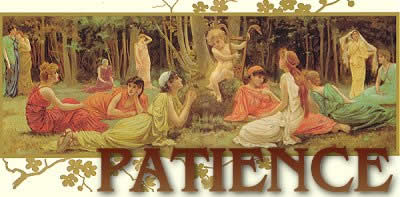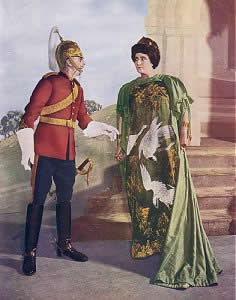You are here: > > > Act I
Dialogue following No. 4
Angela. Oh, sir, leave us; our minds are but ill-tuned to light love-talk.
Major. But what in the world has come over you all?
Jane. Bunthorne! He has come over us. He has come among us, and he has idealized us.
Duke. Has he succeeded in idealizing you?
Jane. He has!
Duke. Good old Bunthorne!
Jane. My eyes are open; I droop despairingly; I am soulfully intense; I am limp and I cling!
During this Bunthorne is seen in all the agonies of composition. The Ladies are watching him intently as he writhes. At last he hits on the word he wants and writes it down. A general sense of relief.
Bunthorne. Finished! At last! Finished!
He staggers, overcome with the mental strain, into the arms of the Colonel.
Colonel. Are you better now?
Bunthorne. Yes - oh, it's you! -- I am better now. The poem is finished, and my soul has gone out into it. That was all. It was nothing worth mentioning, it occurs three times a day. (Sees Patience, who has entered during this scene.) Ah, Patience! Dear Patience! (Holds her hand; she seems frightened.)
Angela. Will it please you read it to us, sir?
Saphir. This we supplicate. (All kneel.)
Bunthorne. Shall I?
Dragoons. No!
Bunthorne. (annoyed - to Patience) I will read it if you bid me!
Patience. (much frightened) You can if you like!
Bunthorne. It is a wild, weird, fleshy thing; yet very tender, very yearning, very precious. It is called, "Oh, Hollow! Hollow! Hollow!"
Patience. Is it a hunting song?
Bunthorne. A hunting song? No, it is not a hunting song. It is the wail of the poet's heart on discovering that everything is commonplace. To understand it, cling passionately to one another and think of faint lilies. (They do so as he recites)
"OH, HOLLOW! HOLLOW! HOLLOW!"
What time the poet hath hymned
The writhing maid, lithe-limbed,
Quivering on amaranthine asphodel,
How can he paint her woes,
Knowing, as well he knows,
That all can be set right with calomel?
When from the poet's plinth
The amorous colocynth
Yearns for the aloe, faint with rapturous thrills,
How can he hymn their throes
Knowing, as well he knows,
That they are only uncompounded pills?
Is it, and can it be,
Nature hath this decree,
Nothing poetic in the world shall dwell?
Or that in all her works
Something poetic lurks,
Even in colocynth and calomel?
I cannot tell.
Exit Bunthorne.
Angela. How purely fragrant!
Saphir. How earnestly precious!
Patience. Well, it seems to me to be nonsense.
Saphir. Nonsense, yes, perhaps - but oh, what precious nonsense!
Colonel. This is all very well, but you seem to forget that you are engaged to us.
Saphir. It can never be. You are not Empyrean. You are not Della Cruscan. You are not even Early English. Oh, be Early English ere it is too late!
Officers look at each other in astonishment.
Jane. (looking at uniform) Red and Yellow! Primary colours! Oh, South Kensington!
Duke. We didn't design our uniforms, but we don't see how they could be improved!
Jane. No, you wouldn't. Still, there is a cobwebby grey velvet, with a tender bloom like cold gravy, which, made Florentine fourteenth century, trimmed with Venetian leather and Spanish altar lace, and surmounted with something Japanese - it matters not what - would at least be Early English! Come, maidens.
Exeunt Maidens, two and two, singing refrain of "Twenty love-sick maidens we". The Officers watch them off in astonishment.
Duke. Gentlemen, this is an insult to the British uniform -
Colonel. A uniform that has been as successful in the courts of Venus as on the field of Mars!
|
Page modified 25 June, 2006

